Ensure Our Community's Future
Planned Giving
THE LIFE AND LEGACY OF I. EDWIN GOLDWASSER (1878-1974)
Founding Executive Director of the Federation for the Support of Jewish Philanthropic Societies of New York City
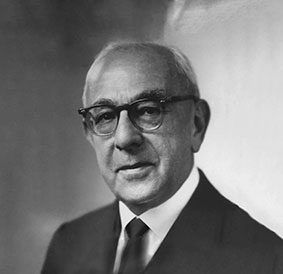 |
When the leaders of New York City’s Jewish community formally resolved in 1916 to establish the Federation for the Support of Jewish Philanthropic Societies, today known as UJA-Federation of New York, the man they chose to lead its day-to-day operations was I. Edwin Goldwasser.
An Innovative and Caring Educator
Born in New York in 1878 to Henry Philip Goldwasser and Rachel Hailblum, immigrants from Europe, Goldwasser grew up on the Lower East Side, the largest Jewish community in New York City. He graduated from the College of the City of New York with a B.S. in 1898 and an M.S. in 1900. He began teaching while working toward an M.A. from Columbia and an M.Ed. from New York University.
Goldwasser had a stellar career as an educator. Dedicated to serving New York’s Jewish community, he insisted on working in Lower East Side public schools. He was a talented teacher with a deep understanding of child psychology, and he introduced innovations that became commonplace, including decorating the school hallways, publishing a class newspaper, and engaging students in playground sports during the school day. In one school, he initiated a student government and created a dental clinic, where thousands of students were examined and treated free of charge.
After teaching children every day, he taught English to his students’ Yiddish-speaking parents in the evening in a storefront schoolroom. Based on that experience, he wrote and published the book Method and Methods in the Teaching of English in 1912.
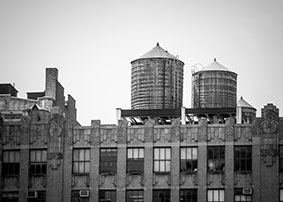 |
At the age of 27, Goldwasser became the principal of P.S. 34 on Broome Street — one of only two Jewish principals in the city at the time. A few years later, he transferred to P.S. 20, located at Chrystie and Rivington streets, where his students included Edward G. Robinson, Paul Muni, Jacob Javits, and George and Ira Gershwin.
Eddy, as he was affectionately known by all, had two guiding stars in life: family and education. As a principal, he treated his charges like family — and for years afterward, he would be instantly recognized and fondly greeted by former students throughout the city. In his own family, he played the role of educator throughout his life, bequeathing to his children and grandchildren an enduring love of learning.
 |
According to the Jewish Communal Register 1917, Goldwasser’s “efficient management of the largest school on the Lower East Side earned for him the promotion to the office of the District Superintendent of Schools of New York City.” He served as superintendent of the Lower East Side district. He also taught at the East Side Evening School, an alternative high school for students who were working and couldn’t attend regular schools.
A Passion for Communal Work
In addition to his paid job, he was deeply involved in Jewish communal work. He served as president of the Society of Jewish Social Workers of Greater New York and chairman of the Advisory Committee of the National Council of Young Men’s Hebrew and Kindred Associations. He was also an advisor to Surprise Lake Camp, one of the first Jewish summer camps in North America.
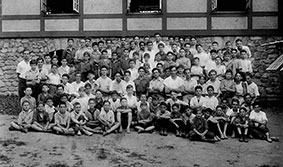 Founded in 1902, Surprise Lake Camp is one of the two oldest Jewish camps in the U.S. Goldwasser was the camp’s first chairman in 1914. Photo by permission of Surprise Lake Camp |
Surprise Lake was founded in 1902 to serve boys from the Lower East Side — the same population that Goldwasser taught — and he served as the camp’s first chairman. Supporting Surprise Lake became a family tradition: Goldwasser’s daughter Marjorie Wyler served as president and, for 50 years, as a board member; his granddaughter Ruth Messinger served on and chaired the board as well, and two of her children and two of her grandchildren attended the camp.
Goldwasser’s talent for Jewish communal work was noticed by Felix Warburg, the German-born banker who was a founder of Surprise Lake and one of the leaders of New York City’s Jewish philanthropic community. Goldwasser was nearly 40 when Warburg recruited him to lead the new Federation.
The Federation for the Support of Jewish Philanthropic Societies of New York City officially began operating on January 1, 1917, with Goldwasser as its first executive director.
Guiding the Fledgling Federation
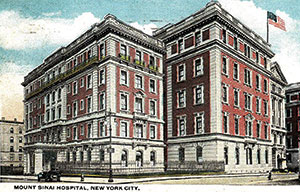 Many venerable New York Jewish institutions affiliated themselves with the newly established Federation, including Mt. Sinai hospital. Founded in 1852, the hospital had already moved to its current site on Fifth Avenue at 100th St. |
At the close of its first year, according to an article Goldwasser contributed to the Jewish Communal Register, “Federation shows on its list of affiliated societies 84 organizations representing every type of philanthropic communal and religious work undertaken by Jews in the City of New York.” Some exist to this day, including Beth Israel Hospital, the Hebrew Free Loan Society, the Educational Alliance, and, of course, Surprise Lake Camp, one of the first agencies accepted into the new Federation.
“Federation eliminates the duplication and waste of time and money resulting from independent appeals for funds by each institution and the maintenance of separate collection departments,” Goldwasser wrote. He envisioned Federation as a clearinghouse for funds, accepting donations on behalf of all Jewish organizations in New York, not just the formally affiliated organizations, and passing them on as designated by donors.
As he worked to develop the Federation, he made a list of 58 issues he felt the organization should tackle and shared it with Warburg in 1918. His list ranged from suggestions for fundraising (“Shall there be different classes of members?”) to a careful consideration of all the gaps and overlaps he identified in New York City’s Jewish social services infrastructure.
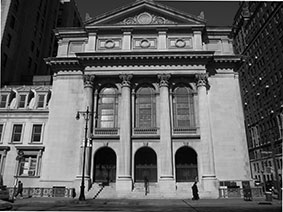 Congregation Shearith Israel, founded in 1654 by Jews of Spanish and Portuguese descent, was in its current location at 70th St. and Central Park West when it became one of the original 84 societies affiliated with the Federation. |
By 1919, in an address he delivered to the Chicago Section of the Council of Jewish Women, his ideas about Federation and Jewish agencies had crystalized into several major themes, including central purchasing, planning for the community to avoid duplication of services, surveying the community to understand its needs, and Federation’s role as coordinator.
“Only a Federation which faces the problems of the community as a whole, instead of the desire of the various institutions to develop their work, can effect this type of coordination and apply the proper perspective,” he proclaimed. “This is the real contribution of a Federation towards the solution of the problems of social welfare.” Goldwasser created a revolutionary marketing plan under the heading, “Make Federation and its work better known to the community.” Years later, in 1955, he noted that the program he had proposed in 1918 had been completely realized, including publishing a handbook of the institutions, disseminating a regular publication, organizing trade committees, launching a women’s campaign, building a publicity department, and establishing donor levels. Just as the new ideas he introduced as an educator have become integral to modern schools, many of his innovations have become essential features of Federation operations.
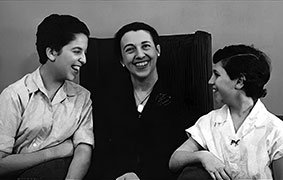 Goldwasser’s daughter Marjorie Wyler in the 1950s with her two daughters, Ruth (left) and Barbara. |
Business Career and Communal Service
After leaving Federation in 1920, Goldwasser went on to a successful career in business as a factor, an intermediary agent who provides cash or financing to companies by purchasing their accounts receivable.
He never stopped working on behalf of the Jewish community, and his life represents one of the most extensive and effective histories of Jewish agency service in New York City. He continued to serve on the Federation board until 1954, including a term as vice president, and he chaired the distribution committee from 1925 to 1950, making decisions about funding of agencies. He was a founder, director, treasurer, and chairman of NYANA (New York Association for New Americans) and an executive committee member of the Jewish Welfare Board. He also served as the director and as an executive committee member of the American Jewish Joint Distribution Committee, participating in negotiations, which were sadly unsuccessful, to rescue the desperate refugees trapped on the MS St. Louis in 1939.
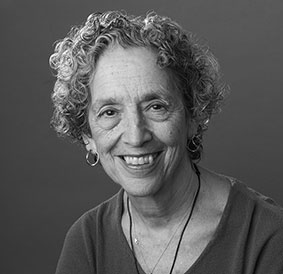 Goldwasser’s granddaughter Ruth Messinger has followed in her grandfather’s footsteps as a distinguished Jewish leader. |
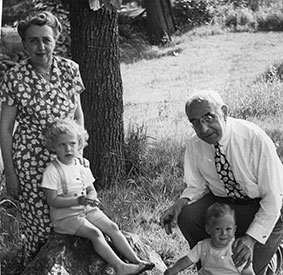 Goldwasser and his wife Edith with two of their 11 grandchildren, Judy and Jim Schine, children of their daughter Joan. |
Goldwasser transmitted to his family his dedication to Jewish communal work as a professional, volunteer, and supporter. For many years, his wife Edith was a board member of a Federation agency that cared for “unwed mothers” and provided adoption services. His daughter Marjorie Wyler worked at the Jewish Theological Seminary for 55 years and was a volunteer leader at UJA-Federation of New York, in addition to her leadership at Surprise Lake Camp; her husband, Wilfred Wyler, served on the board of the Jewish Home and Hospital (now called The New Jewish Home) for over half a century. His granddaughter Ruth Messinger, a distinguished political leader who served as borough president of Manhattan for eight years, was the president and CEO of American Jewish World Service from 1998 to 2016.
 |
A Lasting Legacy
The approach Goldwasser took to organizing the activities of Federation and the astute questions he posed laid the foundation for those who followed him. The processes and innovations he put in place in its earliest days continued to drive the organization throughout the 20th century and beyond.
I. Edwin Goldwasser left a meaningful legacy for the Jewish community. Many have followed in his footsteps, leaving their mark by creating planned gifts to UJA-Federation. These legacy gifts have built a robust endowment that enables UJA-Federation to respond to crises without hesitation, increase day-to-day impact, and secure the Jewish community’s future. Goldwasser’s example has inspired others to ensure a vibrant Jewish community for generations to come.
© Pentera, Inc. Planned giving content. All rights reserved.
Disclaimer